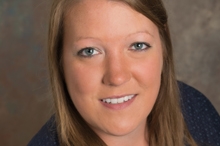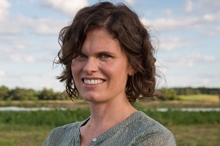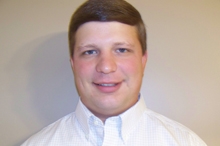Champions of Change Blog
Feeding Our Neighbors and the World
Posted by on August 4, 2014 at 4:49 PM EDT
Quint Pottinger is being honored as a Future of American Agriculture Champion of Change.
When I was three my favorite thing to do was to go riding in the combine with my dad cutting soybeans. When I think back, I can still feel that warm fall setting sun beaming through the cab. I can smell the soybean dust and see the header reel rotate bringing the crop in. That is when I decided I wanted to “spend my life doing what dad does.” My love for farming grew as my responsibilities grew. My love for agriculture began when my high school agriculture teacher opened my eyes about the diverse industry. She challenged me to think outside the box and to explore opportunities outside of my comfort zone. It was there that my passion for agriculture began leading me to attend the University of Kentucky.
One of my professional goals, as well as personal passions, is the need to create solutions for the growing world hunger. When I began to think about how I could be a driving force in creating this change, I turned to my wife for new consumer perspective. Together we decided to build a farm brand to make the American farmer real for our customers. Affinity Farms was established with the initial goal to grow soybeans, corn, and vegetables. By marketing our corn to local distilleries and vegetables at the farmers market, we opened a dialog with our consumers and community about the American agriculture industry.
The American consumer wants to know their farmer and they want to know that the farmer is using safe and sustainable farming practices. By creating this open dialogue, we connect with our consumers. While this is a very important initiative on our farm, it is only one of many goals that my wife and I have set out to accomplish. The world’s population is growing at a quick pace. We cannot and will not feed the world in 2050 with 2015 farming practices. Using cutting edge technology and biotechnology, we can achieve the increased production that will pull us out of this world food dilemma.
Technology is a big piece of the puzzle, but it is not the only piece. Three years ago I had the opportunity to travel to the Panama Canal and to several Colombian soybean buyers and processors. This visit allowed me to see how American soybeans are being used to make fishmeal healthier, higher in protein, and decreasing the inputs making it more affordable for consumers. American agriculture and American farmers are making huge investment in infrastructure to help move more food into hungry foreign markets. In January 2014, I traveled to South Africa to learn about the growing need for food and the challenges they have to push food up through the continent. Being an American farmer and seeing the challenges to feed this world, I can tell you that it will not be easy. We have a tough row to hoe.
Farming is something I love. The dirt does not just stain our hands; it runs deep in our blood. I will be resolute in reaching out to my community to put a face on the farmer. I can speak with certainty that the American farmer is meeting the world food crisis head on, and we will feed this world whether it is through our commodities, production education, or infrastructure development.
Quint Pottinger is member of the Kentucky Soybean Association (KSA), sitting on the KSA board in an educational role with the DuPont Young Leader program. He is also serving with the Corn Growers Coalition promoting young family farmers and a member of the Kentucky Agriculture Leadership Program Class X.
Learn more aboutAgriculture…Imagine What You Can Do
Posted by on August 4, 2014 at 4:42 PM EDT
Pierre Sleiman is being honored as a Future of American Agriculture Champion of Change.
As a little boy, I was always fascinated with science and technology, often preferring to play with wires and circuits rather than other toys. When I was about 15 years old, I discovered an old study on hydroponics (growing plants in water instead of soil) in my dad’s office that had been abandoned. My imagination went wild. What happens when farming goes high-tech? Imagine what you can do…
Today, I am a farmer. However, four years ago neither I nor anyone in my family lineage was a farmer. My undergraduate degree is in computer science and my master’s degree is in business. During a business class in college, we were studying how high-tech companies are decentralizing. Again, agriculture came to mind. Most agricultural production in America is concentrated in relatively small regions and then trucked across the country. What is holding us back from putting small local farms in every city? What are the challenges that can be turned into opportunities? And thus, Go Green Agriculture was born.
As I learned more about agriculture, I quickly realized that farmers today are facing big challenges in supplying a rapidly growing population. Challenges including weather, diminishing arable farmland, pests, disease, food security, and, of course, limited water and other natural resources. Some other statistics also impacted me; for example, the average age of farmers has been rising over the past decades. Today the average farmer is in their late 50s. This tells me that there are few new farmers entering the industry. Let’s face it; the average kid doesn’t think farming is a “cool” profession.
As a person who loves science, technology, engineering and math, I have discovered that farming is the new frontier of untapped potential in these fields. Chemistry, biology, robotics, automation, engineering and computer science are only a few fields that are deeply applicable. From growing food for astronauts in space, producing biofuels that power cars and aircraft, discovering new medical uses for plants, to designing highly productive urban farms in the middle of big cities…the opportunities for creative thinking and innovation are limitless.
The only way to truly exploit the incredible potential of agriculture is to get our youth excited about it. We do not just want agronomy and horticulture college majors to become farmers. We need chemists, engineers, computer scientists, biologists, and more. Interdisciplinary collaboration between diverse groups of people will invigorate creative thinking to produce solutions to challenges that could otherwise not be solved by looking at a problem from just one perspective. The more diversified the better. I am living proof that a computer scientist can become a successful farmer.
Within Go Green Agriculture, we encourage diversity, creative thinking, and ideas from every employee. Externally, I teach and inspire youth, in all fields of study, about the exciting opportunities for creativity and innovation in agriculture. Imagine what you could do…
Pierre Sleiman is the founder and CEO of Go Green Agriculture, an innovative company that grows produce inside high-tech greenhouses using hydroponics. Go Green’s mission is to setup greenhouses across the country to provide local jobs and fresh, delicious, and nutritious produce to the community.
Learn more aboutProducing Future Agriculture Business Owners - with a Side of Vanilla Ice Cream
Posted by on August 4, 2014 at 4:39 PM EDT
Melinda Litvinas is being honored as a Future of American Agriculture Champion of Change.
I am truly honored to be named a Champion of Change for the Future of American Agriculture. Although I grew up in urban Philadelphia, I am a very enthusiastic supporter of any farm market, local foods, and slow food movements, even from a young age. Growing up, I discovered the importance of food not only as a creative outlet but as a field that is ever changing with new challenges every day - especially the challenge of how to feed our population while conserving our natural resources.
As I finished college at Syracuse University, my two main career goals evolved: to operate a successful business and to leave my mark in the food world in positive and influential way. I worked many positions in the food service and culinary management field until I discovered the UDairy Creamery Manager's position in 2010. I knew if I was hired, not only could I fill the University of Delaware's needs for an operations manager but also fulfill my personal goals. As a former food science teaching assistant, I also I found the possibility of teaching students again to be most appealing.
The University of Delaware’s College of Agriculture and Natural Resources has had an operating dairy farm for decades prior to the development of the UDairy Creamery. In 2008, a group of four students and one professor wrote and proposed a business plan to open a creamery in order to help subsidize the costs incurred by operating a research dairy farm. The need to make ends meet in the dairy industry has been an ever-growing issue – and many dairy farmers turn to value-added products, like cheese or dairy, to help diversify their income streams. We received an internal grant from the University called a Unidel Grant, in 2009 for half the cost of the Creamery. The remainder was funded by private donations. I was hired in late 2010 and we opened 6 months later in April of 2011.
In June of 2013, I worked with student interns to partner with the Horn Program for Entrepreneurship within the University’s Lerner School of Business to become the first University with an ice cream truck. The “Moo Mobile” was purchased not only to serve other parts of campus and events, but as a teaching tool for Agriculture and Entrepreneurship students to run a “business for a day.” So far, we have been involved in three courses and several high school outreach programs within Delaware.
The last three years have been a whirlwind of ice cream production, growing store sales, and hundreds of events in which we have been able to share our sustainable story with the University and outside communities. As a non-profit business, all proceeds from ice cream sales go directly to supporting the dairy farm and its teaching programs. I could pride myself in the amount of ice cream we produce or probably the world record amount of homemade waffle cones we have sold or how successful the Creamery has become while I was the manager for three years. It is, however, not what I feel most proud of.
Since 2010, I have had the honor to teach, mentor and work very hard with 24 student interns and over 95 student employees. These students applied to the Creamery not just for an ice cream job but to gain hands on experience in the agriculture and entrepreneurship fields. My students have become food scientists, veterinarians, farmers, small business owners, creamery managers and creamery owners.
I am currently working on plans to start a cheese manufacturing component to the UDairy Creamery, which will become the basis of a new pilot plant. I do hope to expand the Creamery into a full dairy pasteurization plant with an extensive product line. The food science industry is on a steady incline as our enrollment of food science students continues to grow. As the Creamery expands, the hands on experience in the areas in dairy, food, and animal science also expand. I pride myself in producing workforce-ready graduates that will continue to battle and solve the challenges of the food industry today. The students are the real product of the Creamery.
Melinda Litvinas is the University of Delaware’s UDairy Creamery Manager within the College of Agriculture and Natural Resources providing training, teaching and mentoring in entrepreneurship and agribusiness management to University students and community members.
Learn more aboutBringing Young Americans Back to the Farm
Posted by on August 4, 2014 at 4:36 PM EDT
Lindsay Lusher Shute is being honored as a Future of American Agriculture Champion of Change.
With record farmland prices, climate instability, and an agricultural economy often working against them, today’s young farmers and ranchers are all Champions of Change. They are taking tremendous personal and financial risks to feed the country and build a healthy food system.
I am proud to count myself among the nation’s new farmers and to represent my peers through the National Young Farmers Coalition (NYFC). I co-founded NYFC in 2010 to represent, mobilize, and engage young farmers to ensure their success. We are shaping a country where young people who are willing to work hard, get trained, and be entrepreneurial can support themselves and their families in farming. Along with strong local networks and farm services, we believe that access to land, capital, and relief from student loan debt are critical to this goal.
The foundation of a successful farm is affordable land. Farmers must be able to pay the mortgage and make a living from the products they grow on the land. When speculation or non-farm uses drive up the price of land beyond this point, farmers and communities suffer. Prime farmland close to markets is paved over or put out of production, and opportunity is sucked dry from rural places where land is the most valuable resource. This trend is not new. But now, more than ever, we cannot afford to let it continue. With more than two-thirds of America’s farmland set to change hands in the next two decades, we risk losing the land that our next generation of farmers need.
To address this threat, NYFC is partnering with land trusts nationally to conserve land using “working farm” easements that ensure family farmers will always own and farm protected land. Under these new easements, farm families can pass down their land to future generations of growers and have the peace of mind that their lifetime of work will endure. Federal funding and leadership is vital to these easements, directly impacting how land is used in our rural communities.
Keeping farmland available to farmers is only one piece of the puzzle, however. In order to afford this land and begin a career in farming, young entrepreneurs need to build equity in their farm business. Coming from non-farm families, many new farmers must begin by leasing land. They need access to cash to make lease payments, as well as to purchase tools, tractors, animals, feed, and infrastructure. When we surveyed 1,000 young and beginning farmers and ranchers in 2011, 78 percent identified access to capital as a critical challenge to getting started.
Since then, we have worked with the USDA’s Farm Service Agency to introduce a new microloan program and change lending rules to improve loan programs for vegetable and livestock producers. These changes have made a significant difference for thousands of farmers, but more needs to be done. Individual Development Accounts and student loan repayment present important opportunities.
Individual Development Accounts (IDAs), or matched savings accounts, were authorized in the 2008 Farm Bill, but have yet to receive federal funding. IDAs help young farmers raise the capital they need to buy a tractor or other major farm purchases while they are in training. These programs have successfully jumpstarted farm businesses in a handful of states, but public investment is required to benefit farmers in all regions.
While access to land and capital are critical to starting a farm business, helping farmers manage student loan debt is likely the most powerful incentive to keep young people farming. As the Higher Education Act is reauthorized, NYFC is looking to incorporate farmers into the definition of the Public Service Loan Forgiveness Program. That means that if you keep farming for ten years or more, you will get some help paying down any remaining student debt.
Bringing Americans back into agriculture is no small feat, and will require champions in many sectors. I am excited to work with President Obama and the USDA to ensure that young people have the land, capital, and relief from student debt that they need to succeed in farm careers.
Lindsey Lusher Shute is the Co-Founder and Executive Director of the National Young Farmers Coalition. Lindsey and her husband also own and manage Hearty Roots Community Farm, a diversified vegetable farm in Clermont, NY.
Learn more aboutA Bright Future for America’s Breakfasts
Posted by on August 4, 2014 at 4:33 PM EDT
Lee Haynes is being honored as a Future of American Agriculture Champion of Change.
I am a commercial egg farmer from North Alabama.
As a farmer, I have a unique perspective on the plate of eggs many of us enjoy at breakfast time.
Over the last several decades the average age of U.S. farmers has increased and in turn, year by year, the number of farms has decreased. Today, just two percent of U.S. citizens are farmers. With such a small proportion of the population connected personally to a farm or ranch, a disconnect has grown between farmers and consumers. Most consumers are not aware of the great work, research, and care that are put into agricultural products and food.
As a farmer, I am passionate about bringing these two communities together. Our communities, neighbors, and customers should all know the hard work, and strong science behind the practices that we use to produce food for the country!
Several years ago, I got involved with our local county young farmers group. Through them, I had an opportunity to host a TV morning show segment about where your breakfast food comes from. Once customers experienced how hard we worked, the skill needed, and the care we put into everything we do on the farm - we had people calling our farm wanting to know where our products could be purchased.
To every farmer that I know, the products they produce are more than just a way to earn a living. Farmers derive a great sense of pride from what they do and it is a way of life to them. There are no set hours in production agriculture and at times, many farmers work around the clock. Over the last several years there have been many improvements in agriculture technology. These improvements have made farming more efficient and better for the environment. Farmers are true stewards of land and care for it and its sustainability more than anything else. The great efficiency of U.S. farmers allows our country to enjoy the lowest food cost in world.
Farmers’ great sense of pride in what they do results in great quality food and products produced. Farmers go to tremendous lengths to ensure the foods they produce are safe and of the utmost quality. In animal agriculture, the health and safety of animals are top priorities for farmers. Farmers work day in and out with these animals and have great care and respect for them.
I take every opportunity presented to promote not only my farm but agriculture in general. This is vital for the health of agriculture and the sustainability of its future. I challenge all farmers to speak out, and let people know of the great work that you do. I also ask consumers to connect with their agricultural community – to learn about the science and share in the experience of American agriculture. If you do, you will see that farming practices used today are efficient, science-based and proven practices to ensure you top-quality, safe foods and products.
Lee Haynes is a commercial egg farmer from North Alabama. Lee holds a key management role at Nature’s Best Egg Company where he and his father market their own eggs.
Learn more aboutFamily Farming Impacts Community
Posted by on August 4, 2014 at 4:29 PM EDT
Kristin Kubiszak is being honored as a Future of American Agriculture Champion of Change.
I am blessed to work with my family and community on our family farm.
With the birth of my young daughter, Brookside Farms is now a 6th generation farm. This farm has been an integral part of our local community since 1876, when we started out as a dairy. Brookside Farms is situated in the heart of our small town and our family is known for having big hearts for the community. That passion has carried forward throughout the years as we have invested time and effort into a variety of community organizations.
My grandfather planted the first blueberry bush on our property in 1956. Unknowingly, he created an opportunity for our family to not only support ourselves for many generations, but also to reach further into the community through the growth of our farming operations. In 1964, we joined Michigan Blueberry Growers Association (our local blueberry co-op), which has become known as MBG Marketing – or, “The Blueberry People,” the world’s largest grower-owned marketer of blueberries. Being a member of MBG Marketing allows us to spend more time with family while growing our farming business (as they handle most of the marketing and distribution of our berries). At the same time, they provide the means for us to help other blueberry farmers through combining efforts to obtain the best sales for our local farm products. MBG also provides an opportunity for young farmers to grow their leadership skills through their new Young Cooperators program, where both my brother and cousin are involved.
As the farm changed and our family grew, all the young generations of my family all thought we had goals in life that were different and would send us in different directions – away from the farm – as many do when they are young. However, after going our separate ways, we all felt drawn back to our roots and the family farm. In our recent history, the farm was being run by two of my grandfather’s sons, my father and uncle. As my generation came back to the farm, we learned our strengths and weaknesses and filled the farm roles in our own niches. Through our efforts, the farm has grown exponentially in the last decade.
Six years ago, I felt drawn to educating the community about agriculture and decided to join the local Farm Bureau. About a year into my participation in the Van Buren County Farm Bureau, an opportunity arose for me to take a more dedicated position in agricultural education. Now, as the Promotion and Education Chair, I organize and participate in trips to local schools, youth fair Ag-Venture Tent, and other educational programs. Our local school outreach is completed during National Agriculture Week. Our “Ag in the Classroom program” utilizes the “Farmer’s Care Kit” created by Michigan Farm Bureau. This kit allows us to engage the youth in the classrooms in learning about the origin of the food they eat. The Ag-Venture Tent at the Youth Fair offers interaction for children of all ages to engage in a variety of agriculture activities that also teaches various agricultural facts. Children leave with a bag full of goodies about agriculture in our area and tasty treats to match each of the activities completed in the tent.
I am passionate about agriculture and my position as the Retail Manager at Brookside Farms as it allows me to continue my education efforts through constant conversation with customers in our face-to-face environment. This education is not just about agriculture, but also about how family impacts the agriculture on our farm – about how important it is to continue family farms. Our goal is to continue our family heritage of providing excellent produce, not only for our own family, but for our loyal customers and their families for many years and generations to come.
Kristin (Fritz) Kubiszak is the retail store manager for Brookside Farms a 5th generation Michigan farm. She is the Promotion and Education Chair and on the board of directors for the Van Buren County Farm Bureau and is dedicated to educating others about agriculture as it impacts community.
Learn more about
- &lsaquo previous
- …
- 17
- 18
- 19
- 20
- 21
- 22
- 23
- 24
- 25
- …
- next &rsaquo
White House Blogs
- The White House Blog
- Middle Class Task Force
- Council of Economic Advisers
- Council on Environmental Quality
- Council on Women and Girls
- Office of Intergovernmental Affairs
- Office of Management and Budget
- Office of Public Engagement
- Office of Science & Tech Policy
- Office of Urban Affairs
- Open Government
- Faith and Neighborhood Partnerships
- Social Innovation and Civic Participation
- US Trade Representative
- Office National Drug Control Policy
categories
- AIDS Policy
- Alaska
- Blueprint for an America Built to Last
- Budget
- Civil Rights
- Defense
- Disabilities
- Economy
- Education
- Energy and Environment
- Equal Pay
- Ethics
- Faith Based
- Fiscal Responsibility
- Foreign Policy
- Grab Bag
- Health Care
- Homeland Security
- Immigration
- Innovation Fellows
- Inside the White House
- Middle Class Security
- Open Government
- Poverty
- Rural
- Seniors and Social Security
- Service
- Social Innovation
- State of the Union
- Taxes
- Technology
- Urban Policy
- Veterans
- Violence Prevention
- White House Internships
- Women
- Working Families
- Additional Issues

